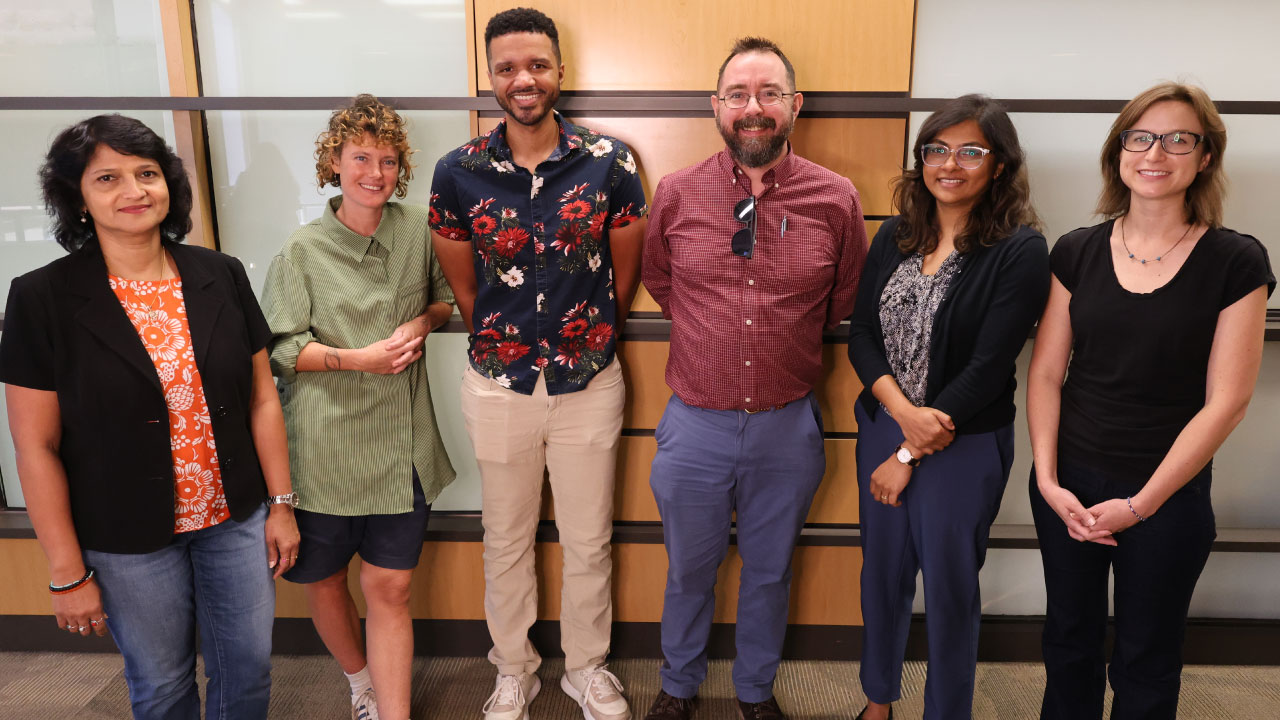content body
Research, along with other high-impact experiences like internships and study abroad, is well known to be highly beneficial for undergraduate students, accelerating their learning, professional development and emotional maturity. Connecting students with research opportunities, however, can be a challenge, especially in the early years of college.
Enter a new Honors College pilot program: The Research Venture Lyceum (RVL). These classes, which offer one-course credit with satisfactory/unsatisfactory grading, will be premiering in the spring to offer small-scale research experiences to Honors students across several fields.
The courses are structured with low enrollments of five students per instructor, so students can work closely with their faculty mentors and classmates as a team to complete one experiment or project during a semester.
Building on past success
“In our planning discussions, we started out by calling these courses the research 'toe-dip,'” said Suzanne Hunter, assistant director of academic affairs for the Honors College. “The whole idea of the RVL is to provide a low-stakes setting for students and faculty to work together on an introductory-level research project, and for students to explore the world of research.
"Our hope is that these courses will be a starting point for students to move on to more ambitious research projects while they are at Auburn and for faculty to recruit those students to their labs.”
Building upon the “Honor Your Teaching” course design fellowship that she created three years ago, Hunter created a second “Honor Your Teaching” fellowship and workshop program this semester for faculty who wanted to participate in the RVL pilot program.
Six faculty ended up joining the program, which involved three course design workshops in August through October.
RVL Offerings this spring
These six faculty members will be offering four Research Venture Lyceums, two of which are being team taught.
The RVLs include traditional laboratory research projects, such as “Introduction to Molecular Techniques,” which is being team-taught by Rodney Tollerson, assistant professor of biological sciences, and Michelle Gibbs, assistant research professor of biological sciences.
They also include interdisciplinary projects such as “Solar Punk Futures,” team-taught by Binita Mahato, associate professor of political science, and Chandana Mitra, professor of geosciences, which will be using a “mixed methods approach” and deploying augmented virtual reality to examine how buildings on Auburn’s campus can be made more energy efficient and sustainable.
“Can I Research Tik-Tok,” which will be taught by Liz Calhoun, lecturer in geosciences, will integrate methodologies from geography, social sciences and communication to examine the social, political and geographic effects of social media platforms.
“Political Science in Science Fiction and Speculative Fiction,” taught by Peter White, will entail both interdisciplinary research and creative endeavor, as a group of students compile an anthology of creative writing that integrates and applies the field of political science.
“I was thrilled to see the ideas that faculty came up with for this program,” said Laura Stevens, Honors College director, “and it was a great experience to gather this group together.”
She commented that the biggest challenge of the workshops was for the faculty to design projects that are achievable within the boundaries of a one-credit course.
“They have all risen to this challenge,” Stevens noted, “helping each other come up with projects that will introduce undergraduates to basic research methods while they work together on really interesting topics.”
Optimistic for the future
The RVL faculty conveyed enthusiasm for the pilot program in the final workshop, as they discussed their pedagogical goals.
Mahato was optimistic that the interdisciplinary scope of “Solar Punk” would help her students “learn techniques to design the world around them in a better way … and to think differently for the future.”
Calhoun hoped that her RVL would position her students to bring “some amount of critical awareness to their own social media use and understand that the question of how digital space develops is actually a global governance issue.”
They also commented on how the RVL model, and the course design workshops, had advanced their own teaching.
“The most beneficial part of this experience was actually interacting with the other faculty,” reported Tollerson, who enjoyed “learning how the faculty use Honors as a way to reach out to students.”
White concurred, adding, “If you’ve ever had sort of an unorthodox idea that you glean from your teaching, but it felt kind of hampered by traditional methods or the need to teach a large class size, Honors is a perfect place for you to explore that new idea.
"You can work with a small, motivated group of students and have an impact on everyone.”
No single requirement or feature defines all Honors classes at Auburn. Instead, these courses, which involve almost all fields of study, share the goal of providing intellectual enrichment for Honors students, enhancing the already rigorous offerings of an Auburn curriculum.
Taught through a variety of approaches, these courses often take advantage of smaller class sizes to utilize more active and collaborative forms of learning.




